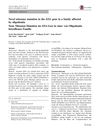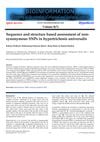 13 citations,
July 2004 in “Skinmed”
13 citations,
July 2004 in “Skinmed” Common types of non-scarring hair loss have various causes and treatments, but more effective solutions are needed.
 12 citations,
January 2016 in “Journal of Orofacial Orthopedics / Fortschritte der Kieferorthopädie”
12 citations,
January 2016 in “Journal of Orofacial Orthopedics / Fortschritte der Kieferorthopädie” Researchers found a new mutation in the EDA gene that likely causes missing teeth and mild skin symptoms in one family.
 11 citations,
September 2012 in “The journal of investigative dermatology/Journal of investigative dermatology”
11 citations,
September 2012 in “The journal of investigative dermatology/Journal of investigative dermatology” A mutation in the KRT71 gene causes a hair disorder by disrupting hair follicle structure and texture.
 10 citations,
January 2010 in “Veterinary pathology”
10 citations,
January 2010 in “Veterinary pathology” A new mutation in the hairless gene causes hair loss and skin wrinkling in mice.
 6 citations,
October 1993 in “The journal of the Royal Society of Health”
6 citations,
October 1993 in “The journal of the Royal Society of Health” Children's hair loss has many causes and requires careful diagnosis and personalized treatment, including emotional support.
 5 citations,
October 2022 in “Heliyon”
5 citations,
October 2022 in “Heliyon” Polycystic ovary syndrome, a disorder causing menstrual issues and infertility, can be treated with lifestyle changes, medication, herbal remedies, surgery, and assisted reproductive techniques like artificial insemination and IVF.
 5 citations,
January 2022 in “PloS one”
5 citations,
January 2022 in “PloS one” Deleting the p63 gene in certain cells causes problems in thymus development and severe hair loss in mice.
 January 2023 in “Pesquisa Veterinária Brasileira”
January 2023 in “Pesquisa Veterinária Brasileira” A KRT71 mutation in Hereford cattle in Uruguay causes thin, curly hair and scaly skin.
 January 2016 in “Springer eBooks”
January 2016 in “Springer eBooks” The document concludes that there are various causes and treatments for hair loss, with hair transplantation being a notable option.
 19 citations,
October 1985 in “British Journal of Dermatology”
19 citations,
October 1985 in “British Journal of Dermatology” The document concludes that unruly hair can be congenital or acquired, often lacks specific treatments, and can be managed with oils and short hairstyles.
 103 citations,
October 2003 in “Birth Defects Research”
103 citations,
October 2003 in “Birth Defects Research” Both genes and environmental factors like chemicals may contribute to the increase in hypospadias, but the exact causes are still unclear.
 45 citations,
April 2018 in “Nature Reviews Urology”
45 citations,
April 2018 in “Nature Reviews Urology” Male genital development is driven by androgen signaling and understanding it could help address congenital anomalies.
 378 citations,
November 2011 in “Human reproduction update”
378 citations,
November 2011 in “Human reproduction update” Experts recommend using evidence-based methods to diagnose and treat hirsutism, focusing on symptoms and underlying causes.
 176 citations,
June 2017 in “Sexual Medicine Reviews”
176 citations,
June 2017 in “Sexual Medicine Reviews” Erectile dysfunction is increasingly common in men under 40, with many physical and psychological causes, and various treatment options available.
 31 citations,
August 2005 in “The American Journal of Dermatopathology”
31 citations,
August 2005 in “The American Journal of Dermatopathology” The study concluded that PKP1 is essential for skin integrity and hair growth, and its dysfunction causes the symptoms of ectodermal dysplasia/skin fragility syndrome.
 20 citations,
February 2004 in “Clinical and Experimental Ophthalmology”
20 citations,
February 2004 in “Clinical and Experimental Ophthalmology” Eye exams are crucial for kids with 13q deletion syndrome, tamoxifen can cause vision loss, Propecia may lead to cataracts, Lipoid Proteinosis causes skin bumps, and OCT is useful for diagnosing macular diseases.
 13 citations,
February 2016 in “Clinical Medicine”
13 citations,
February 2016 in “Clinical Medicine” The document concludes that diagnosing and treating hair loss is complex and requires understanding its psychological effects and underlying causes, while also calling for more research and new treatments.
 August 2023 in “International Ayurvedic medical journal”
August 2023 in “International Ayurvedic medical journal” Improper diet, lifestyle, and stress are major causes of hair fall.

The document explains different types of skin lesions and their characteristics, causes, and related conditions.
 89 citations,
November 2014 in “Medical Clinics of North America”
89 citations,
November 2014 in “Medical Clinics of North America” Eating 500 fewer calories a day and making lifestyle changes can improve PCOS symptoms and reduce diabetes risk; more research is needed on its causes and treatments.
 2 citations,
May 2009 in “Medicine”
2 citations,
May 2009 in “Medicine” Hair and nails can help diagnose diseases, with nail issues often linked to skin conditions and hair loss having various causes and treatments.
 10 citations,
April 2018 in “Maturitas”
10 citations,
April 2018 in “Maturitas” Excess male hormones in postmenopausal women can cause health issues and increase the risk of heart disease and diabetes; treatment depends on the cause.
 10 citations,
December 1995 in “Journal of women's health”
10 citations,
December 1995 in “Journal of women's health” Finasteride reduces hair growth in women with hirsutism and works better with electrolysis.
 1 citations,
December 1997 in “Journal of The European Academy of Dermatology and Venereology”
1 citations,
December 1997 in “Journal of The European Academy of Dermatology and Venereology” All women with significant unwanted hair growth have hormonal imbalances, often from polycystic ovary syndrome.
 December 1997 in “Journal of The European Academy of Dermatology and Venereology”
December 1997 in “Journal of The European Academy of Dermatology and Venereology” Most women with excessive hair growth have a hormonal cause.
 86 citations,
March 1993 in “Toxicology and Applied Pharmacology”
86 citations,
March 1993 in “Toxicology and Applied Pharmacology” Finasteride affects male rat genitalia development, causing abnormalities during specific pregnancy days.
 24 citations,
January 2015 in “Current problems in dermatology”
24 citations,
January 2015 in “Current problems in dermatology” The document concludes that accurate diagnosis of hair loss in children is crucial due to limited treatment options and the condition's psychological impact.
 19 citations,
July 2013 in “The obstetrician & gynaecologist”
19 citations,
July 2013 in “The obstetrician & gynaecologist” The document concludes that careful evaluation is needed to diagnose PCOS correctly due to similar symptoms in other conditions, and accurate testosterone level measurement is crucial.
 4 citations,
April 2012 in “Our Dermatology Online”
4 citations,
April 2012 in “Our Dermatology Online” The conclusion is that PCOS is a common cause of hirsutism in young obese women, and early treatment is important to reduce the risk of metabolic syndrome.
 3 citations,
April 2012 in “Bioinformation”
3 citations,
April 2012 in “Bioinformation” Two specific SNPs in the TRPS1 gene cause excessive hair growth by altering the protein's structure.






























